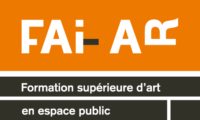General coordination
Christelle Blouët, coordinator – Réseau Culture 21 (FR)
Loïc Magnant, director – FAI-AR (FR)
Aline Présumey, general secretary – FAI-AR (FR)
Instructional design
Christelle Blouët, coordinator – Réseau Culture 21(FR)
Camille Fourès, educational manager – FAI-AR (FR)
Loïc Magnant, director – FAI-AR (FR)
Content exprtise
Anne Aubry, project manager – Réseau Culture 21 (FR)
Christelle Blouët, coordinator – Réseau Culture 21 (FR)
Matina Magkou, cultural management consultant (FR)
Barbera Visser, video producer (FR)
Multimedia production
Christelle Blouët, coordinator – Réseau Culture 21 (FR)
Vania Lugeni, sound designer (FR)
Barbera Visser, video producer (FR)
Technical coordination
Samantha Giordano, digital project manager and communication officer – FAI-AR (FR)
Graphic design and communication
Léa Franceschini, graphic designer – Studio Granite (FR)
Samantha Giordano, digital project manager and communication officer – FAI-AR (FR)
Wafaâ Mesbaoui, communication officer – Lieux Publics, IN SITU coordinator (FR)
Fériel Rahli, communication officer – Lieux Publics, IN SITU coordinator (FR)
Paul Timon, motion designer – Ahway (FR)
Traduction
Connected Language service (FR)
Thanks to
Rosalie Gonzalez, general coordinator – Lieux Publics, IN SITU coordinateur (FR)
Théo Millet-Ursin, coordinator officer – Lieux Publics, IN SITU coordinator (FR)
Speakers
Anne Aubry, project manager – Réseau Culture 21 (FR)
Christelle Blouët, Coordinator – RC21 (FR)
Loïc Magnant, Director – FAI-AR (FR)
Patrice Meyer-Bisch, Philosophy PHD, coordinator of Fribourg group (FR)
Florent Mehmeti, director – Teatri Oda (FR)
Interviewed persons
Matt Adams, co-founder – Blast Theory (UK)
Gabriella Cserháti, artistic director – GK Collective (FR)
Elisa Dumay, founder and director – de l’Aire (FR)
Anna Giribet i Argilès, artistic director – Fira Tàrrega (ES)
Maëva Longvert, founder and stage director – Compagnie Le Polymorphe (FR)
Laëtitia Mandacos, artistic director – Compagnie l’Entaille (FR)
Mikey Martins, artistic director – Freedom Festival 2015-2024 (UK)
Thor MacIntyre-Burnie, artistic director – Aswarm (UK)
Fanni Nánay, artistic manager – Artopolis / PLACCC Festival (HU)
Fabienne Quéméneur, co-coordinator – Au bout du plongeoir (FR)
George Sachinis, coordinator – UrbanDig Project (GR)
Nana Francisca Schottländer, artist (DK)
Zelda Soussan, director and stage manager – Laboratoire Urbain d’Interventions temporaires (FR)
Marine Thévenet, director – CIFAS (BE)
Marion Vian, co-director – Pronomade(s) (FR)
Interventions sonores
Christine Bellavoine, sociologist – Ville de Saint-Denis (FR)
Christelle Blouët, coordinator – Réseau Culture 21 (FR)
Perrine Bouchavon, neighborhood director, Ville de Saint-Denis (FR)
Marion Chevalier, coordinator – La Maison Jaune (FR)
Jean-Pierre Chrétien-Goni, Anthropologist and stage manager – Le Vent de lève (FR)
Julie De Muer, co-founder – Bureau des Guides GR2013 (FR)
Elisa Dumay, director – de l’aire (FR)
Virginie Gautier, writer, visuel artist and teacher – collectif Déplis (FR)
Sarah Guettaï, director of prevention and public safety – Ville de Malakoff (FR)
Christophe Jibard, prevention educator (FR)
Bastien Joussaume, artist-reseacher and artistic director – Sillon (FR)
Julia Maria Lopez, visual artist, director – la Maison Jaune (FR)
Loïc Magnant, co-founder – Bureau des Guides GR2013 (FR)
Laurent Patole, head of cultural events departement – Métropole de Rouen (FR)
Brahim Rajab, director – Le Prunier Sauvage (FR)
Grégoire Robillard, territorial delegate- AFEV (FR)
Zelda Soussan, director and stage manager – LUIT (FR)
Pascale Szpiro, director of community life and neighborhoods – Clichy-sous-Bois (FR)



